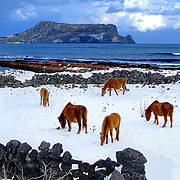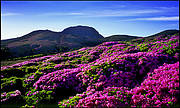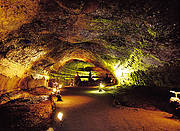Jeju: eco-wonder of the world
05 January 2012 | News story
The largest island of South Korea, Jeju is a crown jewel of the Yellow Sea. Wind-swept palm trees, sandy beaches and volcanic landscapes – not to forget a unique local culture – will be the stunning backdrop to the 2012 World Conservation Congress next September.
“Jeju, as the venue for the IUCN World Conservation Congress, is a thriving place for ecology as well as cultural sites,” says Chong-Chun Kim, Secretary General of the Korean Organizing Committee for the 2012 World Conservation Congress.
“IUCN sets 14 requirements to qualify as a host for the event and, when the Korean Ministry of Environment together with the Jeju Special Self-Governing Province submitted an application, Jeju was found to be the best in fulfilling these.”
With ecosystems that remain largely untouched, it is no surprise that Jeju figures as a finalist to become a New Wonder of the World. Its geological make-up displays rare volcanic formations, giving rise to the country’s tallest peak and lava tubes of unequalled beauty. It is also home to plant and animal species only found here. This natural wealth earned the island three UNESCO titles in the last 10 years, as well as three designations by the Ramsar Convention on Wetlands.
“Jeju is very special because of the exceptional level of international recognition it has received,” says Tim Badman, Director of IUCN’s World Heritage Programme. “Almost every available means of signalling global conservation importance are demonstrated in Jeju.”
Mount Halla, or Hallasan, was first to take the stand as a Biosphere Reserve in 2002. Tipping at 1,950m, South Korea’s highest mountain features a spectacular crater lake. It is enveloped by the Gotjawal forest, a Ramsar wetland covering 12% of the landmass. The forest is key for recharging the only source of water for the half-million population. Hallasan National Park also nurses a unique flora and fauna, including some endangered species and others endemic to the island.
In 2006, Jeju Volcanic Island and Lava Tubes was nominated as a World Heritage Site. It includes three areas: the Hallasan Biosphere, the Seongsan Ilchulbong tuff cone soaring out of the sea and the rare Geomunoreum lava tube system, regarded as the most impressive in the world.
In the last two years, nine sites have also been added to the Global Geoparks Network, a body informally endorsed by UNESCO to boost local economies while maintaining strong sustainability goals. Three sites also now figure on the Ramsar List of Wetlands of International Importance, further showing the breadth of Jeju’s environment. The ability to promote these natural assets will go a long way in ensuring growth on the island is kept in line with natural and cultural conservation.
“These international designations make different sorts of contributions to sustainable development. What’s important is that they’re part of an integrated approach to making the best out of conservation of Jeju as a whole and recognizing the need for communities to benefit from doing conservation as well,” says Badman.
Because Jeju boasts the warmest sea temperature in South Korea, tourism has become a main economic spinner since its onset 50 years ago. With greater recognition of the island’s ecological wealth and cultural uniqueness come more income opportunities for the local population.
Visitors can easily tour places of ecological interest, which often set the scene for local myths and rituals. Such curiosities as the grotto temple and healing water of the Sanbangsan spiritual mountain, to name one, are captivating examples of the importance of nature in defining Jeju’s distinct culture.
Another major attraction is the enigmatic mushroom-capped figures carved out of the volcanic rock. These “stone grandfathers” are said to be fertility gods granting protection against demons and serve well Jeju’s reputation as Honeymoon Island.
One of the best times of the year to visit Jeju is September, as the warm summer weather lingers on and schools reclaim Korean tourists to the mainland. Incidentally, this is precisely when the World Conservation Congress will be held, kicking off on 6 September.
On 13 September, congress participants will have the opportunity to appreciate the vast extent of Jeju’s natural beauty during a day of ecological tours organized by the Korean Organizing Committee.





